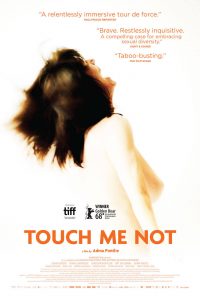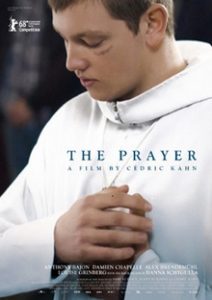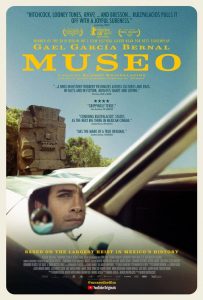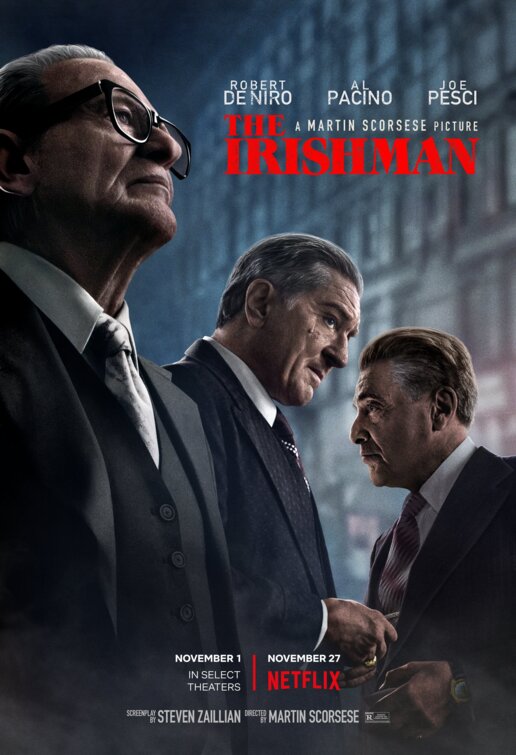Posts Tagged ‘Harvey Keitel’
2018 Berlin Film Festival Winners
The 68th annual Berlin International Film Festival was held from 15th to the 25th February, 2018
The Berlin International Film Festival known as the Berlinale takes places annually in February and is regarded as one of the most prestigious film festivals in the world.

Golden Bear for Best Film: Touch Me Not – directed by Adina Pintilie

Silver Bear for Best Director: Wes Anderson – Isle of Dogs – starring Tilda Swinton, Bill Murray, Edward Norton, Frances McDormand, Harvey Keitel, F. Murray Abraham and Liev Schreiber

Silver Bear for Best Actor: Cedric Kahn – The Prayer

Silver Bear for Best Actress: Ana Brun – The Heiress

Silver Bear for Best Script: Alonso Ruizpalacios – Museo starring Gael Garcia Bernal
Betrayal and Remorse
The Irishman

Director: Martin Scorsese
Cast: Robert de Niro, Al Pacino, Joe Pesci, Bobby Cannavale, Harvey Keitel, Anna Paquin, Stephen Graham, Ray Romano, Jack Huston, Jesse Plemons
Please note this film is currently only available on the Streaming Service Netflix and had a very limited theatrical release in cinemas.
When I heard that the latest Martin Scorsese film, The Irishman was only going to have a Netflix release I was deeply perplexed. Scorsese has always championed the art of cinema, of audiences watching films in a cinema. Especially his films. Scorsese is also passionate about film restoration both digitally and for preservation purposes.
Considering that The Irishman runs for 3 and a half hours, I can understand why Scorsese choose the world’s most famous streaming service to release his latest masterpiece. Most of Scorsese’s other films run for under 3 hours which is manageable in a cinematic format and palatable for audiences to sit through.
The Irishman is exceptionally long but it is worth the reward considering the talent that Scorsese procured to act in this exceptional film about the mafia, hitmen and Union boss Jimmy Hoffa. His long-time collaborator Oscar winner Robert De Niro (Raging Bull, The Godfather Part II) is sensational as Frank Sheeran who is basically in every frame of this digital masterpiece as is Oscar winner Al Pacino (Scent of a Woman) who is utterly captivating as the Union Teamster boss Jimmy Hoffa who mysteriously disappeared in Detroit in 1975.
Equally brilliant is Oscar winner Joe Pesci (Goodfellas) who came out of acting retirement to star as mafia heavyweight Russell Bufalino who answered to the Detroit and Chicago mafia.
Unfortunately, the part of Frank’s disapproving daughter Peggy Sheeran played by Oscar winner Anna Paquin (The Piano) is underwritten and not fully utilized especially in the crucial scenes between her and her father who is basically a hitman for the mob or as some people like to say “I Heard You Paint Houses”.
Al Pacino really steals the show as Jimmy Hoffa a larger than life character who refuses to buckle to pressure from the Mafia even when he allowed them to use the union’s immense pension money to fund the mob’s gambling operations in Las Vegas and Atlantic City in the 1960’s and early 1970’s.
The Irishman could have had 30 minutes shaved off the film and Scorsese could have released it in cinemas as I personally found the last section of this epic tale dragged considerably especially when trying to view it on a mobile device.
Superb performances by De Niro, Pesci and Pacino make The Irishman worth watching but viewers be sure to have three and a half hours spare. It’s a stunning film but could have been edited sufficiently to condense the exceptionally large canvas that Scorsese always tries to paint, except in this case it’s a streaming canvas which has made Netflix even wealthier.
The Irishman gets a film rating of 8.5 out of 10 and is recommended viewing purely for the phenomenal acting of such veteran stars as De Niro, Pesci and of course Pacino who is a revelation.
Let’s see how The Irishman fares during the 2020 Awards Season although if Al Pacino doesn’t win a Best Supporting Actor Oscar for his role, then that is a great cinematic injustice.
Horror or Desire
Youth
Director: Paolo Sorrentino
Cast: Michael Caine, Harvey Keitel, Rachel Weisz, Paul Dano, Jane Fonda, Nate Dern, Ed Stoppard, Tom Lipinski, Alex Beckett, Alex Macqueen
Italian director Paolo Sorrentino first caught my attention with the visually impressive film, This Must be the Place about an aging rocker who leaves England and travels across America. The film starred Sean Penn. Then Sorrentino made the beautiful La Dolce Vita inspired masterpiece, The Great Beauty set in Rome about an aging playboy who reflects on his life of indulgence and decadence.
Now, Sorrentino returns with another visually impressive film Youth starring Michael Caine, Harvey Keitel and Jane Fonda. Youth is film as art.
A sublime and intriguing cinematic meditation on both the horrors and concealed desires of aging. It is a superb film, especially the last third of the film, which is so visually arresting and gorgeous it will be difficult for viewers not to be moved.
Set mainly in a luxurious Swiss Spa resort which naturally focuses on well-being, health and vitality, Youth centres on the uncomplicated friendship between two aging celebrities, Fred Ballinger, superbly played by Oscar winner Michael Caine (The Cider House Rules) and film director Mick Boyle also brilliantly played by Harvey Keitel (Casino, The Piano).
Oscar winner Rachel Weisz (The Constant Gardener) also stars as Ballinger petulant but continuously sad daughter and assistant, who happens to be married to Boyle’s son.
Paul Dano (There will be Blood) appears as a hip Hollywood actor who is experimenting with his next major onscreen role. He finally decides to choose Desire over Horror.
The repartee between Keitel and Caine is superb, punctuated by some fantastically crafted scenes on aging bodies recuperating under the guidance of the Swiss. Ballinger is also constantly being pestered by the Queen of England’s emissary to conduct a concert of one of his most prolific works, Simple Songs, which was created as a sign of his complicated love for his wife.
Youth is a beautiful film, wonderfully shot, taking full advantage of the pristine Swiss countryside and surrounding mountain ranges. What is even more captivating in the film, is Michael Caine’s droll and almost nonchalant performance as the reluctant composer who is being enticed at every turn to come out of semi-retirement.
Caine’s performance is phenomenal considering how few well-written roles there are in Hollywood for actors over the age of seventy in this youth obsessed digitized contemporary culture that currently influence Western cinema. Which brings us to the second most captivating scene in the film, the mind-blowing moment between Harvey Keitel and screen legend and icon, Jane Fonda (Barbarella, The China Syndrome, The Butler). In such a brief scene, Fonda is sizzling and absolutely defines the film.
Fonda plays Brenda Morrell a high maintenance Hollywood diva who unexpectedly arrives at the Swiss resort to break some startling news to her director Mick Boyle. This scene is cinematically brilliant in that it occurs just after Ballinger and Boyle are drooling over the voluptuous Miss Universe as she takes a dip in the same swimming pool they are in.
Youth is a cinematic feast, a gorgeous and rich meditation on the wonders and horrors of grow old gracefully. Aesthetically challenging, Youth is highly recommended viewing and worth a visit for a discerning audience who like their films to be inventive, invigorating and poignant.
Fading Reign of Art Nouveau
The Grand Budapest Hotel
Director: Wes Anderson
Cast: Ralph Fiennes, Jude Law, F. Murray Abraham, Harvey Keitel, Willem Dafoe, Adrien Brody, Owen Wilson, Bill Murray, Tom Wilkinson, Tilda Swinton
Moonrise Kingdom director Wes Anderson assembles a hugely talented ensemble cast led by the irresistable Ralph fiennes as Gustave H. a suave Concierge at The Grand Budapest Hotel who gets embroiled in a whimsical art theft after his benefactor dies mysteriously and her evil son Dimitri played by Adrien Brody pursues the eloquent and flamboyant Gustave in a fictitious republic of Zubrowka representative of a modern day Yugoslavia or even The Czech Republic, but emblematic of a crumbling decadent and ravaged Eastern Europe.
The Grand Budapest Hotel is a wonderful plot, inventive, hilarious, witty and beautifully orchestrated matched by a superb ensemble cast the likes of which haven’t been seen on screen for years including Oscar nominees F. Murray Abraham (Amadeus), Harvey Keitel (Bugsy), Willem Dafoe (Shadow of a Vampire), Bill Murray (Lost in Translation), Edward Norton (Primal Fear), Tom Wilkinson (Michael Clayton), Saoirse Ronan (Atonement) and Jude Law (The Talented Mr Ripley) – all consummate character actors and brilliant performers in the own right.
Each perfectly constructed shot in the Grand Budapest Hotel is a pastiche of old European movies and landscapes reminiscent of a time between the wars when civility was still in fashion. When Old European Hotels were lavish and comfortable establishments with Bell Boys, Lift Operators, Chefs and naturally charming yet slimy Concierges adding to the intrigue of its elegance. When Hotels were places to spend a week, when time was plentiful and guests came to languish in the extraordinary facilities of these beautifully decadent Hotels which populated the ski slopes and small towns of Austria, Germany, Italy and Switzerland.
Even though, the fictional country, Zubrowka is representative of a mixture of Eastern European countries which all suffered under the Nazi’s and then under the Communists, the institutional history of such a charming hotel remained the centre of a town’s attraction, where legends of its fabled guests were passed down over the decades. The Grand Budapest Hotel reflects an era when Art Nouveau reigned supreme especially in the 1930’s. This comedy set in 1932, featuring a complicated and whimsical if not absolutely witty plot is deftly handled by screenwriter Anderson who makes sure each of his cast members whether on screen for a second or for several scenes delivers a perfect performance.
The cast also includes Lea Seydoux, Mathieu Amalric, Owen Wilson and Tilda Swinton. Inspired by the works of 20th century Austrian writer Stefan Zweig, The Grand Budapest Hotel is expertly crafted, dazzlingly assembled and wonderfully executed. A real treat of a film which will sure to delight audiences for years to come much like the Hotel whose guests found its hidden charms suitably enchanting. Highly recommended viewing and a winner of the Grand Jury Prize at the 2014 Berlin Film Festival, The Grand Budapest Hotel is marvelous, whimsical, witty and comical with an underlying menace attached to the action, making the comedy almost tragic in its relevance.








